- Home
- A. S. Byatt
Elementals Page 8
Elementals Read online
Page 8
‘I’ll show you,’ said Hugh, taking her to the open window. ‘Look at the snow on the lawns, in the rose-garden.’
And there, lightly imprinted, preserved by the frost, were the tracks of fine bare feet, running lightly, skipping, eddying, dancing.
Fiammarosa did not blush; her whiteness became whiter, the ice-skin thicker. She was alive in the cold air of the window.
‘Have you been watching me?’
‘Only from the window,’ said Hugh, ‘to see that you came to no harm. You can see that the only footprints are fine, and elegant, and naked. If I had followed you I should have left tracks.’
‘I see,’ said Fiammarosa.
‘And,’ said Hugh, ‘I have been watching you since you were a little girl, and I recognise happiness and health when I see it.’
‘Tell me about the icewoman.’
‘Her name was Fror. She was given by her father, as a pledge for a truce between the ice-people and King Beriman. The chronicles describe her as wondrously fair and slender, and they say also that King Beriman loved her distractedly, and that she did not return his love. They say she showed an ill will, liked to haunt caverns and rivers and refused to learn the language of this kingdom. They say she danced by moonlight, on the longest night, and that there were those in the kingdom who believed she was a witch, who had enchanted the King. She was seen, dancing naked, with three white hares, which were thought to be creatures of witchcraft, under the moon, and she was imprisoned in the cells under the palace. There she gave birth to a son, who was taken from her, and given to his father. And the priests wanted to burn the icewoman, “to melt her stubbornness and punish her stiffness”, but the King would not allow it.
‘Then one day, three northmen came riding to the gate of the castle, tall men with axes on white horses, and said they had come “to take back our woman to her own air”. No one knew how they had been summoned: the priests said that it was by witchcraft that she had called to them from her stone cell. It may have been. It seems clear that there was a threat of war if the woman was not relinquished. So she was fetched out, and “wrapped in a cloak to cover her thinness and decay” and told she could ride away with her kinsmen. The chronicler says she did not ask to see her husband or her tiny son, but “cold and unfeeling as she had come” mounted behind one of the northmen and they turned and rode away together.
‘And King Beriman died not long after, of a broken heart or of witchcraft, and his brother reigned until Leonin was old enough to be crowned. The chronicler says that Leonin made a “warm-blooded and warm-hearted” ruler, as though the blood of his forefathers ran true in him, and the “frozen lymph” of his maternal stock was melted away to nothing.
‘But I believe that after generations, a lost face, a lost being, can find a form again.’
‘You think I am an icewoman.’
‘I think you carry the inheritance of that northern princess. I think also that her nature was much misunderstood, and that what appeared to be kindness was extreme cruelty – paradoxically, probably her life was preserved by what appeared to be the cruellest act of those who held her here, the imprisonment in cold stone walls, the thin prison dress, the bare diet.’
‘I felt that in my bones, listening to your story.’
‘It is your story, Princess. And you too are framed for cold. You must live – when the thaw comes – in cool places. There are ice-houses in the palace gardens – we must build more, and stock them with blocks of ice, before the snow melts.’
Fiammarosa smiled at Hugh with her sharp mouth. She said:
‘You have read my desires. All through my childhood I was barely alive. I felt constantly that I must collapse, vanish, fall into a faint, stifle. Out there, in the cold, I am a living being.’
‘I know.’
‘You choose your words very tactfully, Hugh. You told me I was “framed for cold”. That is a statement of natural philosophy, and time. It may be that I have ice in my veins, like the icewoman, or something that boils and steams at normal temperatures, and flows busily in deep frost. But you did not tell me I had a cold nature. The icewoman did not look back at her husband and son. Perhaps she was cold in her soul, as well as in her veins?’
‘That is for you to say. It is so long ago, the tale of the icewoman. Maybe she saw King Beriman only as a captor and conqueror? Maybe she loved someone else, in the North, in the snow? Maybe she felt as you feel, on a summer’s day, barely there, yawning for faintness, moving in shadows.’
‘How do you know how I feel, Hugh?’
‘I watch you. I study you. I love you.’
Fiammarosa noticed, in her cool mind, that she did not love Hugh, whatever love was.
She wondered whether this was a loss, or a gain. She was inclined to think, on balance, that it was a gain. She had been so much loved, as a little child, and all that heaping of anxious love had simply made her feel ill and exhausted. There was more life in coldness. In solitude. Inside a crackling skin of protective ice that was also a sensuous delight.
After this clarification, even when the thaw came, and the snow ran away, and fell in damp, crashing masses from the roof and the branches, Fiammarosa’s life was better. Hugh convinced the King and Queen that their daughter needed to be cold to survive, and the ingenuity that had been put into keeping her warm and muffled was diverted, on his suggestion, into the construction of ice-houses, and cool bedrooms with stone walls on the north side of the palace. The new Fiammarosa was full of spiky life. She made little gardens of mountain snow-plants around her ice-retreats, which stood like so many summer-houses in the woods and the gardens. No one accused her of witchcraft – this was a later age – but there was perhaps a little less love for this coldly shining, fiercely energetic, sharp being than there had been for the milky girl in her rosy cushions. She studied snow-crystals and ice formations under a magnifying glass, in the winter, and studied the forms of her wintry flowers and mosses in the summer. She became an artist – all princesses are compelled to be artists, they must spin, or draw, or embroider, and she had always dutifully done so, producing heaps of cushions and walls of good-enough drawings. She hated ‘good enough’ but had had to be content with it. Now she began to weave tapestries, with silver threads and ice-blue threads, with night violets and cool primroses, which mixed the geometric forms of the snow-crystals with the delicate forms of the moss and rosettes of petals, and produced shimmering, intricate tapestries that were much more than ‘good enough’, that were unlike anything seen before in that land. She became an assiduous correspondent, writing to gardeners and natural philosophers, to spinners of threads and weavers all over the world. She was happy, and in the winter, when the world froze again under an iron-grey sky, she was ecstatic.
Princesses, also, are expected to marry. They are expected to marry for dynastic reasons, to cement an alliance, to placate a powerful rival, to bear royal heirs. They are, in the old stories, gifts and rewards, handed over by their loving fathers to heroes and adventurers who must undergo trials, or save people. It would appear, Fiammarosa had thought as a young girl, reading both histories and wonder tales, that princesses are commodities. But also, in the same histories and tales, it can be seen that this is not so. Princesses are captious and clever choosers. They tempt and test their suitors, they sit like spiders inside walls adorned with the skulls of the unsuccessful, they require superhuman feats of strength and cunning from their suitors, and are not above helping out, or weeping over, those who appeal to their hearts. They follow their chosen lovers through rough deserts, and ocean tempests, they ride on the wings of the north wind and enlist the help of ants and eagles, trout and mice, hares and ducks, to rescue these suddenly helpless husbands from the clutches of scheming witches, or ogre-kings. They do have, in real life, the power to reject and some power to choose. They are wooed. She had considered her own cold heart in this context and had thought that she would do better, ideally, to remain unmarried. She was too happy alone to make a good bride.
She could not think out a course of action entirely but had vaguely decided upon a course of prevarication and intimidation, if suitors presented themselves. For their own sakes, as much as for her own. She was sorry, in the abstract – she thought a great deal in the abstract, it suited her – for anyone who should love her, or think it a good idea to love her. She did not believe she was truly lovable. Beside her parents, and her brothers, whose love was automatic and unseeing, the only person who truly loved her was Hugh. And her cold eye, and her cold mind, had measured the gulf between what Hugh felt for her and what she felt for him. She tried never to let it show; she was grateful, his company was comfortable to her. But both he and she were intelligent beings, and both knew how things stood.
The King had his own ideas, which he believed were wise and subtle, about all this. He believed his daughter needed to marry more than most women. He believed she needed to be softened and opened to the world, that she had inherited from the unsatisfactory icewoman a dangerous, brittle edge which would hurt her more than anyone else. He believed it would be good for his daughter to be melted smooth, though he did not, in his thinking, push this metaphor too far. He had a mental image of an icicle running with water, not of an absent icicle and a warm, formless pool. He thought the sensible thing would be to marry this cold creature to a prince from the icelands from which the original Fror had been snatched by King Beriman, and he sent letters to Prince Boris, beyond the mountains, with a sample of his daughter’s weaving, and a painting of her white beauty, her fine bones, blue eyes and cool gold hair. He was a great believer in protocol, and protocol had always, at these times, meant that the picture and the invitation must go to many princes, and not only one. There must be a feast, and something of a competition. What happened customarily was that the Princess’s portrait would go simultaneously (allowing for the vagaries of horses and camels, galleons and mule trains) to many eligible princes. The princes, in turn, on receiving the portrait, would return gifts, sumptuous gifts, striking gifts, to the king, to be given to the Princess. And if she found them acceptable (or if her father did), then the princes would make the journey in person, and the Princess, in person, would make her choice. In this way, the King offended none of his proud neighbours, leaving the choice to the whim, or the aesthetic inclination, of the young woman herself. Of course, if there were any pressing reason why one alliance was more desirable than another, most fathers would enlighten their daughters, and some would exhort or threaten. In the case of Fiammarosa none of this applied. Her father wished her to marry for her own good, and he wished her to marry Prince Boris simply because his kingdom was cold and full of icebergs and glaciers, where she would be at home. But he did not say this, for he knew that women are perverse.
The portraits, the letters, dispersed through the known world. After a time, the presents began to return. A small golden envoy from the East brought a silken robe, flame-coloured, embroidered with peacocks, light as air. A rope of pearls, black, rose, and luminous pale ones, the size of larks’ eggs, came from an island kingdom, and a three-dimensional carved chess game, all in different jades, with little staircases and turrets edged with gold, came from a tiny country between two deserts. There were heaps of gold and silver plates, a leopard in a cage, which sickened and died, a harp, a miniature pony, and an illuminated treatise on necromancy. The King and Queen watched Fiammarosa as she gravely thanked the messengers. She appeared to be interested in the mechanism of an Orcalian musical box, but only scientifically interested, so to speak. Then Prince Boris’s envoy arrived, a tall fair man with a gold beard and two gold plaits, riding a hairy, flea-bitten warhorse, and followed by packhorses with great pine chests. He opened these with a flourish, and brought out a robe of silver fox-fur, an extraordinary bonnet, hung with the black-tipped tails of ermine stoats, and a whalebone box, polished like a new tooth, containing a necklace of bears’ claws threaded on a silver chain. The Princess put her thin hands, involuntarily, to her slender throat. The envoy said that the necklace had been worn by Prince Boris’s mother, and by her mother before her. He was clad in fleeces and wore a huge circular fur hat coming down over his ears. Fiammarosa said that the gifts were magnificent. She said this so gracefully that her mother looked to see if some ancestral inkling in her responded to bears’ claws. There was no colour at all in her lips, or in her cheeks, but with her that could be a sign of pleasure – she whitened, where other women blushed. The King thought to himself that a man and his gifts were not the same thing. He thought that the narrow neck would have a barbaric beauty, circled by the polished sharp claws, but he did not wish to see it.
The last envoy declared that he was not the last envoy, having been parted from his fellows on their dangerous voyage. They had travelled separately, so that one at least of them might arrive with his gift. Prince Sasan, he said, had been much moved by the Princess’s portrait. She was the woman he had seen in his dreams, said the envoy, lyrically. The Princess, whose dreams entertained no visitors, only white spaces, wheeling birds and snowflakes, smiled composedly, without warmth. The envoy’s gift took a long time to unwrap. It was packed in straw, and fine leather, and silk. When it was revealed, it appeared at first sight to be a rough block of ice. Then, slowly, it was seen to be a glass palace, within the ice, so to speak, as hallucinatory turrets and chambers, fantastic carvings and pillars, reveal themselves in the ice and snow of mountain peaks. But once the eye had learned to read the irregularities of the surface, the magnifications and the tunnels within the block, it was seen to be a most cunningly wrought and regularly shaped transparent castle, within whose shining walls corridors ran into fretted chambers, staircases (with carved balustrades) mounted and descended in spirals and curves, in which thrones and pompous curtained beds stood in glistening cubicles, in which miraculous fine curtains of translucent glass floated between archways in still space. The glass castle was large enough for the centre to be hidden from the eye, though all the wide landings, the narrow passages, the doors and gangways, directed the eye to where the thickness of the transparent glass itself resisted penetration. Fiammarosa touched its cool surface with a cool finger. She was entranced by the skill of the layering. It was all done in a crystal-clear glass, with a green-blue tinge to it in places, and a different green-blue conferred simply by thickness itself. The eye looked through, and through, and in. Light went through, and through, and in. Solid walls of light glittered and, seen through their substance, trapped light hung in bright rooms like bubbles. There was one other colour, in all the perspectives of blue, green, and clear. From the dense, invisible centre little tongues of rosy flame (made of glass) ran along the corridors, mounted, gleaming, in the stairwells and hall-ways, threaded like ribbons round galleries, separated, and joined again as flames do, round pillars and gates. Behind a curtain of blue, a thread of rose and flame shone and twisted. The Princess walked round, and back, looking in. ‘It is an image of my master’s heart,’ said the lyrical envoy. ‘It is a poetic image of his empty life, which awaits the delicate warmth of the Princess Fiammarosa in every chamber. He has been set on fire by his vision of the portrait of the Princess.’
The envoy was a sallow young man, with liquid brown eyes. The bluff King and the careful Queen were not impressed by his rhetoric. The Princess went on walking round the glass block, staring in. It was not clear that she had heard his latest remarks.
The second envoy from Prince Sasan arrived a few days later, dusty and travel-worn, another sallow man with brown eyes. His gift was dome-shaped. He too, as he unwrapped it, spoke lyrically of the contents. He did not appear to be speaking to a script; lyricism appeared to spring naturally to the lips of the Sasanians. His gift, he said, was an image, a metaphor, a symbol, for the sweetness and light, the summer world which the thought of the Princess had created in the mind of his master.
The second gift was also made of glass. It was a beehive, a transparent, shining form constructed of layers of hexagonal cells, full of white glass grubs, and amber-co
loured glass honey. Over the surface of the cells crawled, and in the solid atmosphere hung and floated, wonderfully wrought insects, with furry bodies, veined wings, huge eyes and fine antennae. They even carried bags of golden pollen on their black, thread-glass legs. Around the hive were glass flowers with petals of crumpled and gleaming yellow glass, with crowns of fine stamens, with blue bells and fine-throated purple hoods. A fat bee was half-buried in the heart of a spotted snap-dragon. Another uncoiled a proboscis and sipped the heart of a campanula. So, said the lyrical envoy, was the heart of his master touched by the warm thought of the Princess, so was love seeded, and sweetness garnered, in the garden of his heart. Hugh thought that this might be too much for his austere pupil, but she was not listening. She had laid her cool cheek against the cool glass dome, as if to catch the soundless hum of the immobile spun-glass wings.
The third envoy arrived bloodied and incoherent. He had been set upon by bandits and had been forced to hide his package in a hollow tree, from which he had retrieved it, late at night. He unpacked it before the court, murmuring incoherently, ‘So delicate, I shall be tortured, never forgiven, has harm come to it?’ His package was in two parts, tall and cylindrical, fat and spherical. Out of the cylindrical part came a tall glass stem, and a series of fine, fine, glass rods, olive-green, amber, white, which he built, breathing heavily, into an extraordinarily complex web of branches and twigs. It was large – the height, maybe, of a two-year-old child. Folded into his inner garments he had a plan of the intervals of the sprouting of the branches. The assembly took a long time – the Queen suggested that they go and take refreshment and leave the poor, anxious man to complete his labour unobserved and in peace, but Fiammarosa was entranced. She watched each slender stem find its place, breathing quietly, staring intently. The spherical parcel proved to contain a pleroma of small spherical parcels, all nestling together, from which the envoy took a whole world of flowers, fruit, twining creepers, little birds, frost-forms and ice-forms. Part of the tree he hung with buds, tight and bursting, mossy and glistening, rosy and sooty-black. Then he hung blossoms of every kind, apple and cherry, magnolia and catkins, hypericum and chestnut candles. Then he added, radiating among all these, the fruits, oranges and lemons, silver pears and golden apples, rich plums and damsons, ruddy pomegranates and clustered translucent crimson berries and grapes with the bloom on them. Each tiny element was in itself an example of virtuoso glass-making. When he had hung the flowers and the fruit, he perched the birds, a red cardinal, a white dove, a black-capped rosy-breasted bullfinch, a blue Australian wren, an iridescent kingfisher, a blackbird with a gold beak, and in the centre, on the crest of the branches, a bird of paradise with golden eyes in its midnight tail, and a crest of flame. Then he hung winter on the remaining branches, decorating sharp black twigs with filigree leaf skeletons, flounces of snow, and sharp icicles, catching the light and making rainbows in the air. This, he said breathlessly, was his master’s world as it would be if the Princess consented to be his wife, a paradise state with all seasons in one, and the tree of life flowering and fruiting perpetually. There is bleak winter, too, said the Princess, setting an icicle in motion. The envoy looked soulfully at her and said that the essential sap of trees lived through the frost, and so it was with the tree of life, of which this was only an image.

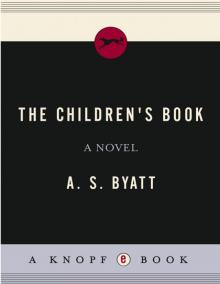 The Children's Book
The Children's Book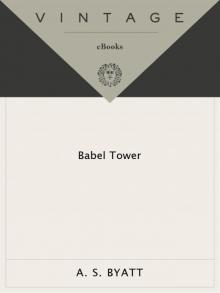 Babel Tower
Babel Tower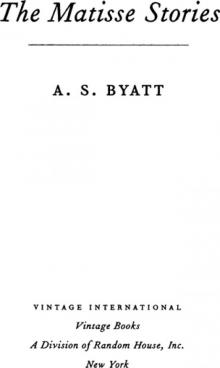 The Matisse Stories
The Matisse Stories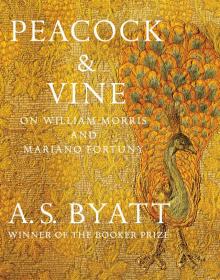 Peacock & Vine: On William Morris and Mariano Fortuny
Peacock & Vine: On William Morris and Mariano Fortuny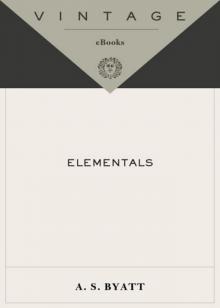 Elementals: Stories of Fire and Ice
Elementals: Stories of Fire and Ice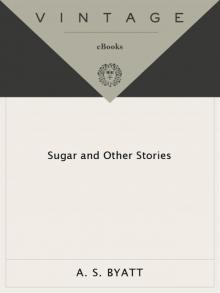 Sugar and Other Stories
Sugar and Other Stories Possession
Possession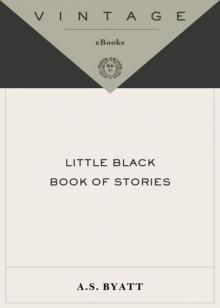 Little Black Book of Stories
Little Black Book of Stories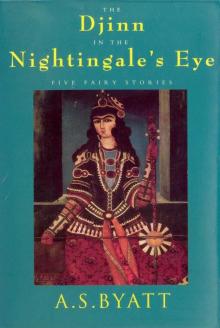 The Djinn in the Nightingale's Eye
The Djinn in the Nightingale's Eye The Virgin in the Garden
The Virgin in the Garden The Game
The Game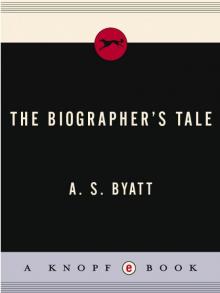 The Biographer's Tale
The Biographer's Tale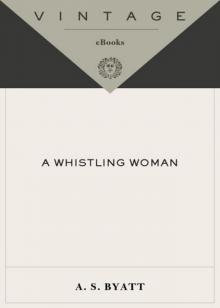 A Whistling Woman
A Whistling Woman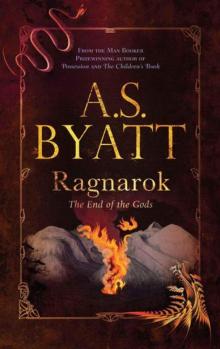 Ragnarok
Ragnarok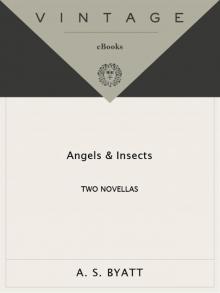 Angels & Insects: Two Novellas
Angels & Insects: Two Novellas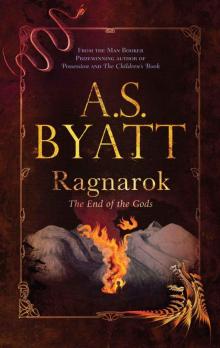 Ragnarok: the End of the Gods (Myths)
Ragnarok: the End of the Gods (Myths)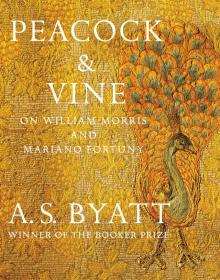 Peacock & Vine
Peacock & Vine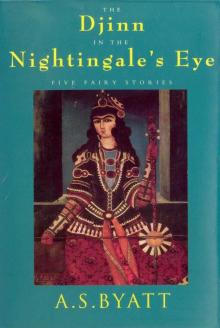 The Djinn in the Nightingale's Eye (Vintage International)
The Djinn in the Nightingale's Eye (Vintage International)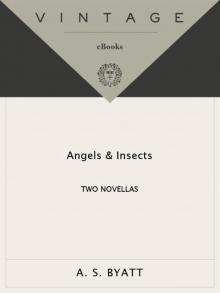 Angels and Insects
Angels and Insects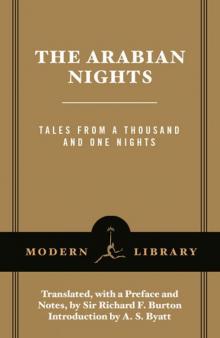 The Arabian Nights: Tales from a Thousand and One Nights (Modern Library Classics)
The Arabian Nights: Tales from a Thousand and One Nights (Modern Library Classics)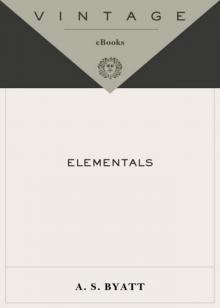 Elementals
Elementals